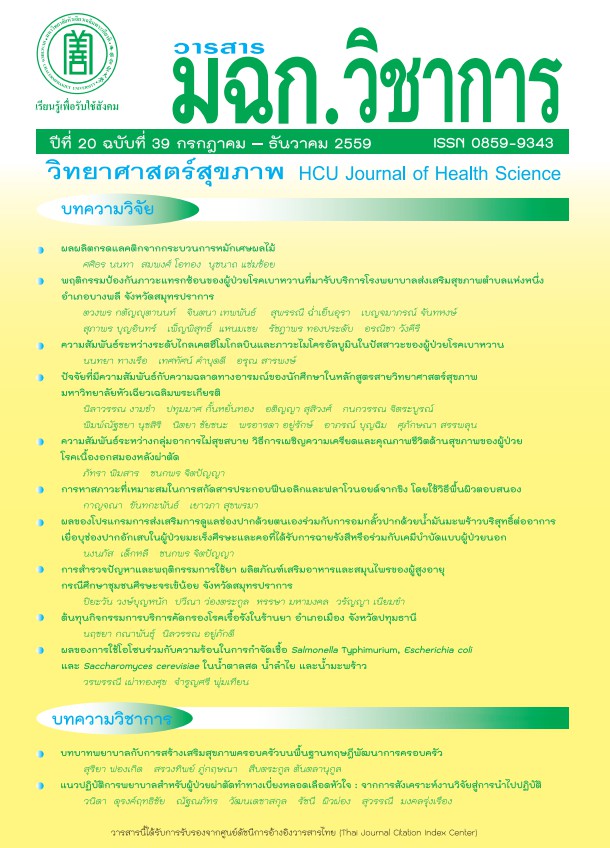Relationships among Symptom Cluster, Method of Coping and Health Related Quality of Life In Brain Tumor Patients Receiving Brain Surgery
Keywords:
Quality of life, brain tumor, symptom cluster, method of coping, brain surgery patientAbstract
The purpose of descriptive research was to investigate the relationships among symptom cluster, coping and health related quality of life in patients with brain tumor after surgery. The samples were 110 brain tumor patients, who were followed up at the Outpatient Department of Prasat Neurological Institute, Rajavithi Hospital and Police Hospital after surgery not more than 6 months. Research instruments included symptom cluster questionnaire, method of coping questionnaire and Thai version of EORCT C-30. Content validity was examined by five experts. The Instruments were tested by using reliability Conbach’s alpha coefficient obtained at .64, 0.91 and .90, respectively. Data were analyzed using frequency, mean, standard deviation and Pearson’s product moment coefficient. The major finding showed that mean of health related quality of life in brain tumor patients after brain surgery (x- = 77.08) was higher than the reference mean (x- = 68.88). Symptom cluster were negative significant correlated with health related quality of life in brain tumor patients after brain surgery (r = -.520). Method of coping were not correlated to health related quality of life in brain tumor patients after brain surgery.
Downloads
References
ปราณี มิ่งขวัญ. (2542) ความเครียดและการเผชิญความเครียดในผู้ป่วยสูงอายุโรคหลอดเลือดสมอง. วิทยานิพนธ์ พย.ม. (การพยาบาลผู้สูงอายุ) เชียงใหม่ : บัณฑิตวิทยาลัย มหาวิทยาลัยเชียงใหม่.
วราภรณ์ นาครัตน์. (2533) ความสัมพันธ์ระหว่างการสนับสนุนทางสังคมกับพฤติกรรมการเผชิญความเครียดของผู้ป่วยโรคหัวใจ. วิทยานิพนธ์ พย.ม. (การพยาบาลผู้ใหญ่) กรุงเทพมหานคร :
บัณฑิตวิทยาลัย มหาวิทยาลัยมหิดล.
ศรัณย์ นันทอารี. (2552) “การรักษาเนื้องอกในสมอง” [ออนไลน์] แหล่งที่มา : http://www.thaibraintumor.com/index.php?option=com_content&view=article&id=5&Itemid=77 (24
สิงหาคม 2556)
อรชร บุติพันดา. (2553) ความสัมพันธ์ระหว่างการรับรู้ภาวะสุขภาพ การสนับสนุนทางสังคมกับภาวะการทำหน้าที่ของผู้ป่วยเนื้องอกสมองหลังผ่าตัด. วิทยานิพนธ์ พย.ม. (การพยาบาล
ผู้ใหญ่) กรุงเทพมหานคร : บัณฑิตวิทยาลัย มหาวิทยาลัยมหิดล.
อำนวยพร อาษานอก. (2549) ปัจจัยคัดสรรที่มีความสัมพันธ์กับคุณภาพชีวิตของผู้ป่วยวัยผู้ใหญ่โรคเนื้องอกสมอง. วิทยานิพนธ์ พย.ม. (การพยาบาลศาสตร์) กรุงเทพมหานคร : บัณฑิตวิทยาลัย
จุฬาลงกรณ์มหาวิทยาลัย.
อังศินันท์ อินทรกำแหง. (2551) “การสังเคราะห์งานวิจัยที่เกี่ยวกับความเครียดและการเผชิญความเครียดของคนไทย” วารสารพฤติกรรมศาสตร์. 14 (1) หน้า 135-150.
Aaronson, N K. (May 1988) “Quality of life: What is it? How should it be measured?” Oncology Willston Park 2 (5) page 69-76.
Dodd, M. J. et al. (July 2004) “Occurrence of symptom clusters” Journal of the National Cancer Institute Monographs. 32 page 76-78.
Gustafsson, M. et al. (December 2006) “The relationship between function, quality of life and coping in patients with low-grade gliomas” Support Care Cancer. 14 page
1205-1212.
Hannegan, L. (June 1989) “Transient cognitive changes after craniotomy” Journal of Neuroscience Nursing. 21 (3) page 165-170.
Jalowiec, A. et al. (May-June 1984) “Psychometric assessment of the Jalowiec Coping Scale” Nursing Research. 33 (3) page 157-161.
Lazalus, R. S., and Folkman, S. (1984) Stress, appraisal and coping. New York : Spring Publish.
Lovely, M. P. et al. (June 1999) “Relationship between fatigue and Quality of life in patients with glioblastoma multiformae” Oncology Nursing Forum. 26 (5) page
921.
Moos, R. H. and Schaefer, J. A. (June 1989) Coping with physical illness: New Perspectives (Vol. 2). New York : Plenum Press.
Scott, N. W. et al. (2008) “EORTC QLQ-C30 Reference Values” [Online] Available : http://groups.eortc.be/qol/sites/default/files/img/newsletter/reference_values_manual
2008.pdf (26 December 2014)
Silpakit, C. et al. (February 2006) “The European Organization for Research and treatment of Cancer Quality of Life Questionnaire(EORTC QLQ-C30) : validation study of
the Thai version” Journal of Quality of Life. 15 (1) page 167-172.
Downloads
Published
How to Cite
Issue
Section
License
บทความที่ได้รับการตีพิมพ์เป็นลิขสิทธิ์ของวารสารวิทยาศาสตร์สุขภาพและสุขภาวะ
ข้อความที่ปรากฏในบทความแต่ละเรื่องในวารสารวิชาการเล่มนี้เป็นความคิดเห็นส่วนตัวของผู้เขียนแต่ละท่านไม่เกี่ยวข้องกับมหาวิทยาลัยหัวเฉียวเฉลิมพระเกียรติ และคณาจารย์ท่านอื่นๆในมหาวิทยาลัยฯ แต่อย่างใด ความรับผิดชอบองค์ประกอบทั้งหมดของบทความแต่ละเรื่องเป็นของผู้เขียนแต่ละท่าน หากมีความผิดพลาดใดๆ ผู้เขียนแต่ละท่านจะรับผิดชอบบทความของตนเองแต่ผู้เดียว




